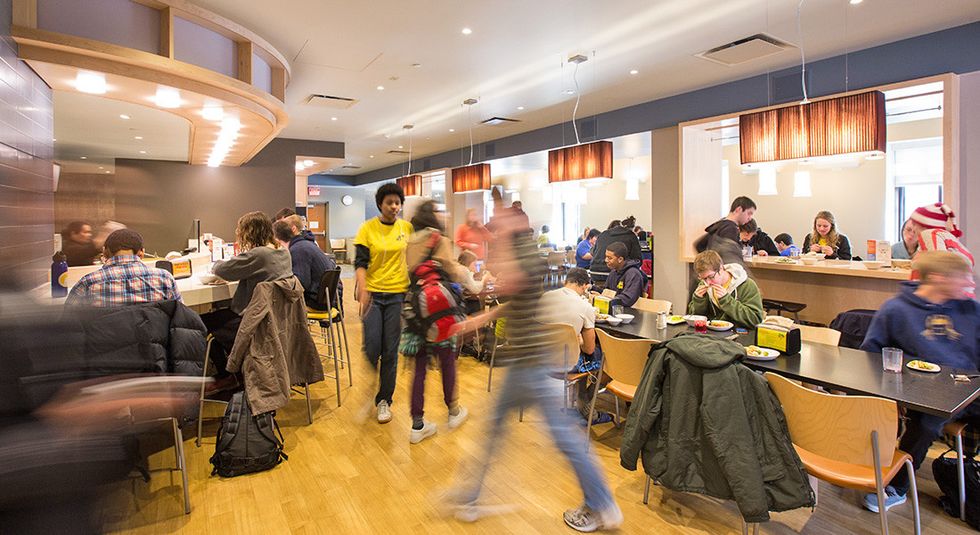College brings with it numerous expenses, even beyond the hefty prices of tuition and room and board. Most college students begin to understand more than ever the need for financial prudence and astuteness as they balance the costs of things like food, clothes, and textbooks. Thankfully, juggling finances doesn't have to be a daunting and stressful task; in fact, there are several simple and practical ways that college students can eliminate unnecessary spending and increase their savings.
Use your dining plan and limit the number of times you eat out.

If you're a student living on-campus, chances are that your school requires you to purchase a dining plan. Such a meal plan can easily cost a few thousand dollars a semester, which is no small sum. So even if the dining hall doesn't seem nearly as exciting as going out to grab pizza or McDonald's with friends, try to take advantage of the meal plan you're already paying for. Eating out once in a while can be a fun treat, but try to avoid unnecessarily blowing a lot of funds on fast food when you're already spending thousands on a dining plan each semester.
Ask for practical gifts on your birthday and holidays.

The next time someone asks what you want for your birthday, try to mention a few practical items that you'd otherwise have to buy yourself, such as shampoo, notebooks, or printer paper. You may also consider asking for gift cards for places like Amazon and Walmart. These gifts may not seem very exciting, but it's amazing how quickly college makes you appreciate receiving a bottle of shampoo for your birthday. When you're spending thousands on tuition, receiving practical necessities like these as gifts can be incredibly helpful.
Find cheaper textbook options.

You can drastically reduce the amount of money you fork out each semester if you go the route of renting your textbooks instead of buying them. Furthermore, be sure to check out places like Amazon, Chegg, and eBay when hunting for textbooks. Quite often (but not always) you can find your textbooks for a much better price on these sites than from your university bookstore. Finally, check and see whether other students from your school are selling their used textbooks for the classes you're taking (another way to avoid high bookstore prices).
Only buy a car if you really need it.

If you're living off campus or have some sort of job or other obligation/activity that requires frequent transportation, then bringing a car to school may be a wise choice. However, if a car isn't something you absolutely need to get around (e.g., if you're a residential student for whom most things are within walking distance), then think carefully before dropping your money on a car. Besides the price of the car itself, you'll also have to cover costs like gas, maintenance, and parking permits at school. Therefore, decide whether or not having a car is a necessity and make sure you weigh the costs and benefits of owning one, especially while at school.
Find cheap and/or free ways to have fun with your friends.

Spending a free night with your friends doesn't have to entail going out to eat at a restaurant, shopping at the mall, or seeing a movie at the theater. These activities are all certainly enjoyable, but if they're your only source of entertainment, your bank account will quickly be drained. Many schools organize fun and free (or extremely low-cost) events for students, such as outdoor movie nights, tailgates before football games, and game nights (as well as free or cheap admission to the student section for sports games).
If you need to print a lot of materials for your classes, consider purchasing a printer.

Buying a printer may not make much sense if you don't often have to print out things for your classes - after all, a high-quality printer usually has a hefty price tag. However, if you're in a major where you know you'll often need to print materials throughout your time at college, buying your own printer may end up being cheaper in the long run than constantly paying to use the ones provided in the campus computer lab.
If you have room in your schedule, consider working part-time during the school year.

Even if you can only work 10 hours per week, you'll thank yourself for putting in the effort when it comes time to make a run to the store or to make tuition payments. Every little bit of money helps, and oftentimes, you can find a place to work at on-campus (e.g., in the library, as a tutor, or at a restaurant). Working on-campus is great for the experience, the money, and the convenience!
Try to test out of some classes.

If you're interested, you can pay to take CLEP exams at your school's testing center, thereby allowing you to earn credit for certain general education classes (e.g., math, English, or science) without having to actually take those classes. These tests do cost money, but if you feel confident that you'll do well enough to pass, taking CLEP exams can help you save money by allowing you to test out of certain classes and therefore perhaps graduate in less than four years (meaning you won't have to spend as much money on school).
Take advantage of your campus library.

Whether you're looking for a scholarly book or some recreational reading, your school's library has a vast array of sources right at your fingertips. You can find books, magazines, newspapers, and DVDs, to name a few things. If there's a book you want/need to read or a movie you want to see, check for it at the library before you go spend lots of money purchasing it elsewhere. You can save a significant amount of money if you forego buying a book at the bookstore or purchasing a Netflix account and instead opt to check out books and movies for free at the library.

















